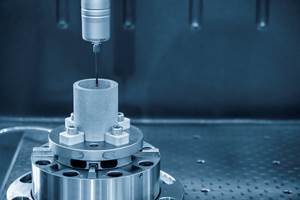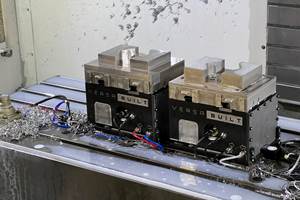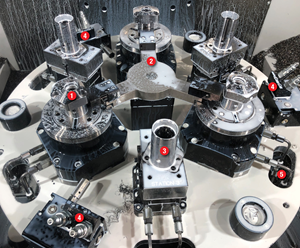Chuck Helps Restore Thin-Walled, Hardened Parts To Roundness
Heat treating can distort parts, especially round, thin-walled workpieces. During finish-turning, such components can conform to the shape of the chuck, only to spring back to an out-of-round state after clamping. Hardinge has developed a chuck with multiple gripping fingers to avoid this problem.
Share




Heat-treating a delicate, thin-walled workpiece in order to achieve the desired hardness often results in the part coming back “out of round.” Although finish turning the part can provide some measure of roundness improvement, it is often not enough to meet specifications.
To address this problem, workholding solution provider Hardinge has developed a chuck designed specifically to tackle the problem of thin-walled, hardened parts that require high roundness accuracy. In a recent study, the company reported that a hard-turning process incorporating the chuck improved roundness approximately 10 times better than conventional workholding devices when used on the very same machines.
The problem arises during the heat-treat process, which uses time and temperature to alter the part’s microstructure—and in turn, the mechanical properties of the steel. The thermal and residual stresses that develop during the carburization, harden/quench and temper processes distort the part’s ID and/or OD, causing it to come back out-of-round.
A common strategy for addressing this problem is finish turning. During this operation, shops typically employ a conventional workholding device such as a jaw chuck, diaphragm chuck or step chuck with low gripping forces to avoid crushing or distorting the part. However, clamping the part can cause it to artificially “round up” via distortion and conform to the shape of the chuck. When the part is released, it springs back to its original out-of-round state.
Unlike traditional workholding devices, however, Hardinge’s Shape-Compliant Chuck features multiple gripping fingers that act independently to grip the part “as is” and avoid artificial rounding. To demonstrate the chuck’s effectiveness, the company conducted a study comparing its performance to that of a conventional step chuck when hard-turning bearing races.
The bearing race used in the study was a 60-64 Rc through-hardened part with an OD measuring approximately 2.25 inches (57.15 mm). The machine of choice for the application, a Hardinge Quest turning center, features hydrostatic linear guideways and a Harcrete-reinforced cast iron base. Gripping the bearing race at the machine’s lowest possible pressure setting with a conventional step chuck resulted in 1.35 times improved roundness.
However, when the bearing race was hard-bored on the same turning center with the Shape-Compliant Chuck, it maintained its out-of-round state during the cutting process, resulting in 10.9 times improved roundness. ID-to-OD concentricity was less than 0.00004 inch (1.01 micrometers). Speeds were maintained at 400 sfm at 940 rpm using CBN tooling and processed with two passes, each with a DOC of 0.003 inch (76.2 micrometers).
The particular model Shape-Compliant Chuck that was used in the study has eight gripping fingers that act independently to avoid artificially rounding the part. According to the company, other productivity benefits include rapid actuation, allowing more parts per hour; adjustable gripping forces; and high damping to reduce tool chatter and prolong tool life. Chuck models are available with an outer diameter gripping range from 0.5 to 4 inches (12.7 to 101.6 mm). They are manufactured to order by application according to applied force levels, operational speed range, grip points, jaw requirements, workpiece condition, accuracy levels and robot loading requirements.
Related Content
Parts and Programs: Setup for Success
Tips for program and work setups that can simplify adjustments and troubleshooting.
Read MoreCustom Workholding Shaves Days From Medical Part Setup Times
Custom workholding enabled Resolve Surgical Technologies to place all sizes of one trauma part onto a single machine — and cut days from the setup times.
Read MoreUsing Jaws as Grippers Enables Flexible, Low-Cost Automation
VersaBuilt’s automation systems significantly boosted Innovative Fabrication’s revenue. In return, the shop has helped VersaBuilt optimize its products.
Read MoreMachining Vektek Hydraulic Swing Clamp Bodies Using Royal Products Collet Fixtures
A study in repeatable and flexible workholding by one OEM for another.
Read MoreRead Next
Building Out a Foundation for Student Machinists
Autodesk and Haas have teamed up to produce an introductory course for students that covers the basics of CAD, CAM and CNC while providing them with a portfolio part.
Read More5 Rules of Thumb for Buying CNC Machine Tools
Use these tips to carefully plan your machine tool purchases and to avoid regretting your decision later.
Read MoreRegistration Now Open for the Precision Machining Technology Show (PMTS) 2025
The precision machining industry’s premier event returns to Cleveland, OH, April 1-3.
Read More
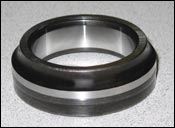
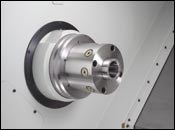
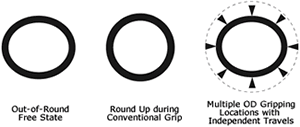



















.jpg;maxWidth=300;quality=90)







